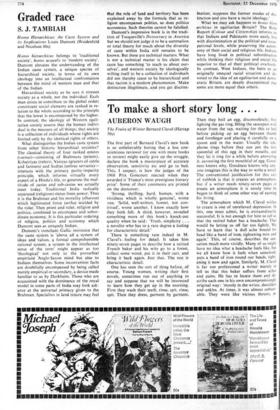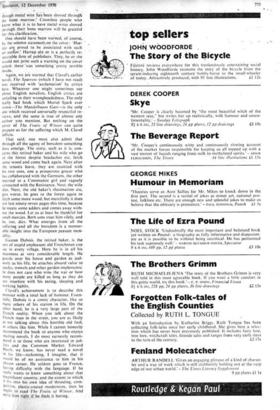To make a short story long . .
AUBERON WAUGH
The Fruits of Winter Bernard Clavel (Harrap 50s) The first part of Bernard Clavel's new book is so unbelievably boring that a less con- scientious reviewer (or one with more books to review) might easily give up the struggle, declare the book a masterpiece of accurate observation, sensitivity etc and go to bed. This, I suspect, is how the judges of the 1968 Prix Goncourt reacted when they awarded it 'France's most prestigious literary prize'. Some of their comments are printed on the dustcover.
'Strong, thrilling, hard, human, with a vividness which is wholly genuine', wrote one. 'Solid, well-written, honest, not con- trived', wrote another. I know exactly how they both felt. A third, however, revealed something more of this book's knock-out quality when he said: 'Truth, simplicity .
a novelist who has to a rare degree a feeling for characteristic detail.'
-There is something rare indeed in M. Clavel's- feeling for detail. It takes him ninety-seven pages to describe how a retired French baker and his wife go to a forest, collect some wood, put it in their cart, and bring it back again. Just that. The rest is characteristic detail.
One has seen the sort of thing before, of course. Young women, writing their first novels, sometimes run out of anything to say and suppose that we will be interested to learn how they get up in the morning. First they wash their teeth, rinse, spit, rinse, spit. Then they dress, garment by garment.
Then they boil an egg, disconsolately, first lighting the gas ring, filling the saucepan with water from the tap, waiting for this to boil before picking up an egg between thumb and forefinger and placing it carefully on a spoon and in the water. Usually the tele- phone rings before they can put the first spoonful of this egg in their mouths, and they let it ring for a while before answering it, savouring the first mouthful of egg. Good- ness knows why. Goodness knows why any- one imagines this is the way to write a novel. The conventional justification for this sort of rubbish is that it creates an atmosphere, but if a writer needs ninety-seven pages to create an atmosphere it is surely time he began to think of some other way of earning his living.
The atmosphere which M. Clivel wishes to create is one of unrelieved depression. In this, one must admit, he is extraordinarily successful. It is not enough for him to tell us that the retired baker has a headache. That would be letting us off far too lightly. We have to learn that 'a dull ache bound his head like a band of iron, tightening now and again.' This, of course, describes the sen- sation much more vividly. Many of us might have no idea what a headache feels like, but we all know how it feels when somebody puts a band of iron round our heads, tight- ening it now and again. Similarly, M. Clavel is far too professional a writer merely to tell us that this baker suffers from aches and pains. He has to locate them and de- scribe each one in his own uncompromisingly original way: 'mostly in the wrists, shoulders and ankles. At times, it was almost unbear- able. They were like vicious thrusts, as tough metal wire has-been shoved through the bone marrow.' Countleis people who know ,what it is to have metal wires shoved thrOugh their bone marrow will be grateful
for this clarification. • ' ;
One should have'been warned, of course, by the solemn staternent•on the cover: 'Hat- rap are proud to, be associated with such an author.' .Harrap ate or is a perfectly re-. spectable firm of publishers. They, he or she would not print such a warning on the cOver- unleA there'-was -something 'pretty terrible inside.
Again, we are warned that Clavel'S earlier novel, The Sparrow (which I have not read) was received -with 'acclamation' by critics here. Whatever one might sometimes say about English novelists, English critics are unfailing in their wrongheadedness. The only really bad book which Muriel Spark ever wrote—The Mandelbaum Gate—is the only one which received universally respectful re- views, and the same is true of almost any author you mention. But nothing on the cover of The Fruits of Winter can quite prepare us for the suffering which M. Clavel inflicts.
That said, one must also admit that through all the agony of boredom something does emerge. The story, such as it is, con- cerns this retired baker and his wife who go to the forest despite headaches etc, fetch some wood and come back again. Next after the tenants leave, they are reunited with his two sons, 'one a prosperous grocer who has collaborated with the Germans, the other married to a Communist girl and vaguely connected with the Resistance. Next, the wife dies. Next, the old baker's rheumatism etc, gets worse, he goes to the forest again to fetch some more wood, but mercifully it does not last ninety-seven pages this time, because he meets some adders and comes away with- out the wood. Let us at least be thankful for small mercies. Both sons treat him vilely, and he. too, dies. What emerges from all the suffering and all the boredom is a memor- able insight into the European peasant men- tality.
Gaston Dubois, the retired baker, is the sort of stupid unpleasant old Frenchman you see in every village. Here he is in all his meanness at very considerable length. He guards over his house and garden as jeal- ously as his life; he attaches absurd value to spades, trowels and other garden implements; he does not care who wins the war or how many people are killed so long as they do not interfere with his eating, sleeping and working habits.
navel's achievement is to describe this monster with a total lack of humour. Essen- tially, Dubois is a comic character, like so many others of his station in life. On the other hand, he is a very large part of the French reality. When you talk about the French man in the street, you are as likely as not talking about this horrible old fool, or others like him. While I cannot honestly recommend the book to anyone who enjoys reading novels, I do most earnestly recom- mend it to those who are interested in pol- itics and the Common Market. Edward Heath, we know, has never read a novel in his life—reckoning, I imagine, that it would be of no assistance to him in his chosen career. He seldom goes to France, having difficulty with the language. If he really wants to know something about that magnificent country, and the extent to which it fits into his own idea of thrusting, com- petitive, plastic-coated modernism, then he Ought to read The Fruits of Winter. And serve him right if he finds it boring.











































 Previous page
Previous page